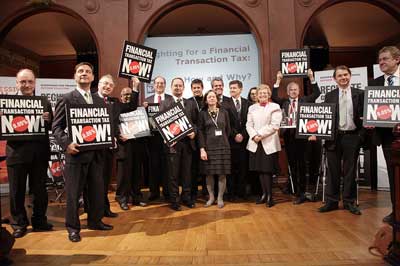
Honest, paywall-free news is rare. Please support our boldly independent journalism with a donation of any size.
Germany’s major political parties have agreed on the need to impose a financial transactions tax (FTT) as part of a broad package of economic reforms to be undertaken by a coalition government.
The German federal elections in September 2013 gave the conservative Chancellor Angela Merkel 311 seats in the German Parliament, just short of a majority. As a result, Merkel is negotiating with other parties to form a governing coalition.
The FTT is very popular in Germany. Eighty-two percent of Germans support an FTT, according to the latest Eurobarometer poll, compared with 64 percent of Europeans as a whole. If Europeans could vote on financial regulation, they would vote for an FTT.
For details on the implications of financial transactions taxes and how they work, see the answers to these Frequently Asked Questions on FTTs.
For good or for bad, Germany is the economic and political heart of the European Union. Europe’s largest country and largest economy has an even larger influence on European politics. In many ways, as goes Germany so goes Europe.
In recent years, this has sometimes been a problem, as when Germany demanded harsh austerity measures in response to the Eurozone banking crises of 2008-12.
At other times, German leadership has been a blessing. Germany has consistently used its influence to promote peace and good governance. And since the NSA was caught tapping Merkel’s phone, Germany has come out strongly in favor of Internet privacy.
Now, Germany is leading the way toward a European FTT. Until the German coalition negotiations, the FTT had faded from the European agenda in the face of determined opposition from big banks and other business interests.
The popularity of the FTT in Germany made it one of the first planks to be agreed upon in the ongoing coalition negotiations. It may take several weeks or months for Germany’s political parties to reach a final agreement. When the new German government takes office, a European FTT likely will be one of its top priorities.
The European Union began moving toward an FTT at the June 2013 Eurozone summit. At that event, European leaders agreed in principle to impose a tax on financial transactions. Their stated goal was to raise money to support European financial institutions.
The main opposition to a European FTT comes from the United Kingdom. The UK government is closely aligned with London’s banks and financial firms. These businesses would bear the brunt of any FTT, because it would make them pay tax every time they traded financial instruments like stocks, bonds and derivatives.
Despite its fierce resistance to a European FTT, the UK has had a tax on stock market transactions since 1808. All industrialized countries have or used to have some form of tax on financial transactions. The difference is that a European FTT would be explicitly designed to slow trading in some of the most profitable – but riskiest – areas of finance.
The UK is a member of the European Union but is not a member of the Euro currency group, the so-called Eurozone. Germany is the most important member of the Eurozone, and the European Central Bank is based in Germany’s financial capital, Frankfurt. If the new German government pushes for an FTT, the Eurozone is likely to follow.
A European FTT would have an important demonstration effect for the rest of the world, including the United States. To date, global financial regulation has been very weak. Pundits who are opposed to financial regulation claim that globalization makes it impossible to tax and regulate banks across borders.
If Europe successfully implements an FTT, it will demonstrate that it is possible to make banks pay for the privilege of trading financial instruments like stocks, bonds and derivatives. This could be an important first step toward creating a more stable global financial system that better serves the interests of the peoples of the world.
A terrifying moment. We appeal for your support.
In the last weeks, we have witnessed an authoritarian assault on communities in Minnesota and across the nation.
The need for truthful, grassroots reporting is urgent at this cataclysmic historical moment. Yet, Trump-aligned billionaires and other allies have taken over many legacy media outlets — the culmination of a decades-long campaign to place control of the narrative into the hands of the political right.
We refuse to let Trump’s blatant propaganda machine go unchecked. Untethered to corporate ownership or advertisers, Truthout remains fearless in our reporting and our determination to use journalism as a tool for justice.
But we need your help just to fund our basic expenses. Over 80 percent of Truthout’s funding comes from small individual donations from our community of readers, and over a third of our total budget is supported by recurring monthly donors.
Truthout has launched a fundraiser, and we have a goal to add 200 new monthly donors in the next 24 hours. Whether you can make a small monthly donation or a larger one-time gift, Truthout only works with your support.